2019
Posted November 11, 2019
Gulf Coast Energy Outlook 2020 Now Available
The LSU Center for Energy Studies and the E. J. Ourso College of Business hosted a
kickoff event on Wednesday, November 6, 2019, to release the 2020 Gulf Coast Energy
Outlook. The 2020 GCEO examines trends in upstream oil and gas activity, transportation
infrastructure and bottlenecks, and downstream investments in refining and petrochemicals.
Energy sector-specific employment forecasts are also provided.
Findings include:
- Drilling activity has slowed this past year, and this slowed pace is expected to continue given low oil and natural gas price forecasts.
- While drilling activity has slowed, production continues to rise due to continued well productivity.
- Increased oil and natural gas production has led to significant and continued pipeline investment opportunities.
- Industrial development and capital expenditures for both Louisiana and Texas have slowed in 2019, but are anticipated to rebound in 2020 through 2023.
David E. Dismukes, executive director and professor, LSU Center for Energy Studies; Dek Terrell, professor, LSU E. J. Ourso College of Business; and Gregory B. Upton, Jr., assistant professor, LSU Center for Energy Studies, authored the report.
Posted October 29, 2019
2020 Gulf Coast Energy Outlook Kickoff Nov. 6
The LSU Center for Energy Studies and the E. J. Ourso College of Business will host a kickoff event on Wednesday, November 6, 2019, at 10 a.m., to release the 2020 Gulf Coast Energy Outlook. The release and a stakeholder briefing will be held at the Dalton J. Woods Auditorium of the LSU Energy, Coast & Environment Building and will survey the current state of the industry and provide a forecast for future industry activity on the Gulf Coast.
The 2020 GCEO is authored by David E. Dismukes, executive director and professor, LSU Center for Energy Studies; Dek Terrell, professor, LSU E. J. Ourso College of Business; and Gregory B. Upton, Jr., assistant professor, LSU Center for Energy Studies.
The 2020 GCEO examines trends in upstream oil and gas activity, transportation infrastructure and bottlenecks, and downstream investments in refining and petrochemicals. Energy sector-specific employment forecasts are also provided.
Findings: Drilling activity has slowed this past year, and this slowed pace is expected to continue given low oil and natural gas price forecasts. While drilling activity has slowed, production continues to rise due to continued well productivity. Increased oil and natural gas production has led to significant and continued pipeline investment opportunities. Industrial development and capital expenditures for both Louisiana and Texas have slowed in 2019, but are anticipated to rebound in 2020 through 2023.
Admission is free for members of the media, students, faculty, university staff, and state employees. All others: $25. All are encouraged to pre-register online.
Event details are as follows:
Date: November 6, 2019
Time: 9:30 a.m. - 10:00 a.m. - Registration/check-in, coffee & danish
10:00 a.m. - 11:00 a.m. - GCEO Presentation and questions/discussion
Location:
Dalton J. Woods Auditorium
Energy, Coast & Environment Building
93 South Quad Drive
Louisiana State University
Baton Rouge, La. 70803
Posted October 1, 2019
Presentation & book signing
Energy Kingdoms: Oil and Political Survival in the Persian Gulf
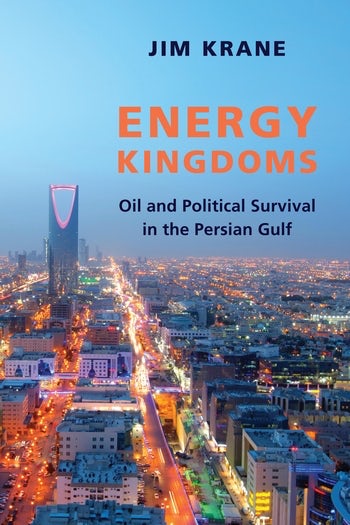
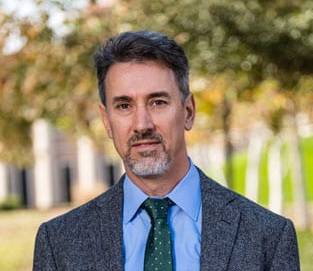
Wednesday, Nov. 13, 2019
3:30 p.m. - 4:30 p.m.
Dalton J. Woods Auditorium
LSU Energy, Coast & Environment Bldg.
RSVP to [email protected]
On Wednesday, Nov. 13, the Center will host Jim Krane, Ph.D., Wallace S. Wilson Fellow for Energy Studies, Baker Institute for Public Policy, Rice University, for a presentation on his book Energy Kingdoms: Oil and Political Survival in the Persian Gulf. Krane will describe how traditional monarchs used oil to remain in power as they transformed the economies of the Persian Gulf states. He will discuss the challenges those nations face as they move to diversify their economies in preparation for climate change. The book will be for sale at the event
From the publisher: After the discovery of oil in the 1930s, the Gulf monarchies—Saudi Arabia, Kuwait, Qatar, the United Arab Emirates, Oman, and Bahrain—went from being among the world’s poorest and most isolated places to some of its most ostentatiously wealthy. To maintain support, the ruling sheikhs provide their subjects with boundless cheap energy, unwittingly leading to some of the highest consumption rates on earth. Today, the Gulf’s rulers find themselves caught in a dilemma: Can they curb their profligacy without jeopardizing the survival of some of the world’s last absolute monarchies?
In Energy Kingdoms, Jim Krane takes readers inside these monarchies to consider their conundrum. He traces the history of the Gulf states’ energy use and policies, looking in particular at how energy subsidies have distorted demand. Oil exports are the lifeblood of their political-economic systems—and the basis of their strategic importance—but domestic consumption has begun eating into exports, while climate change threatens to render their desert region uninhabitable. At risk are the sheikhdoms’ way of life, their relations with their Western protectors, and their political stability in a chaotic region. Backed by rich fieldwork and deep knowledge of the region, Krane expertly lays out the hard choices that Gulf leaders face to keep their states viable. He will also discuss recent attacks on oil infrastructure in Saudi Arabia and the worsening relations between Arab producers and neighboring Iran.
Jim Krane, Ph.D. is the Wallace S. Wilson Fellow for Energy Studies at Rice University’s Baker Institute for Public Policy. He specializes in energy geopolitics, with a focus on oil-exporting countries and the challenges they face from energy subsidies, internal demand and climate change. In a prior career, Krane spent nearly 20 years as a journalist, six of them in the Middle East. He is the author of two books. His acclaimed 2009 volume, City of Gold: Dubai and the Dream of Capitalism, is widely recognized as the seminal work on the iconoclastic city-state, while his 2019 book, Energy Kingdoms: Oil and Political Survival in the Persian Gulf, is the definitive study of energy demand in the region.
Posted September 25, 2019
2020-21 Louisiana Economic Outlook Released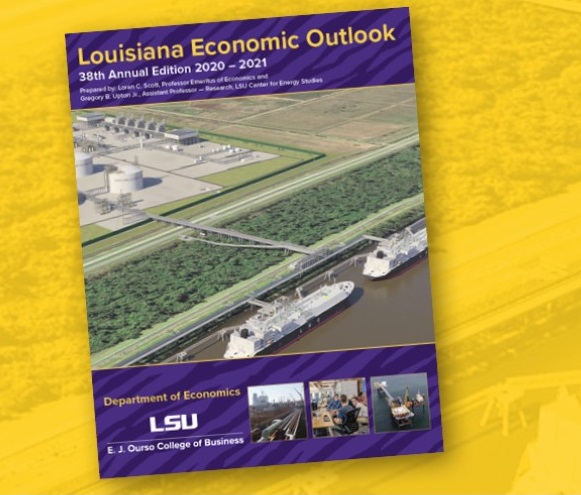
LSU E. J. Ourso College of Business Professor Emeritus of Economics Loren Scott unveiled the 2020-21 Louisiana Economic Outlook (LEO) at The Greater Baton Rouge Business Report’s annual Top 100 Luncheon. The event, held September 24 at the Crowne Plaza, is part of the Louisiana Business Symposium. Greg Upton, assistant professor-research at the Center for Energy Studies, contributed to the LEO.
According to Scott, the 38th edition of the LEO, which is published by the Ourso College’s economics department, shows job growth picking up over the next two years after a slow period in 2018-19. Growth in the state has been held back recently by weak activity in the Gulf of Mexico and an industrial construction “lull” between the building of some very large projects.
“Louisiana has enjoyed a remarkable $188 billion-plus in industrial announcements since 2012. Of that number, about 40 percent have been completed or are underway. In 2019, the state has been in a lull between finishing some projects and starting up new ones. Many of the latter should begin construction over 2020-21, giving a real boost to the Lake Charles, New Orleans and Baton Rouge economies,” said Scott.
Read full release from the E. J. Ourso College of Business.
Posted August 30, 2019
La. Geological Survey Hosts Coastal Symposium
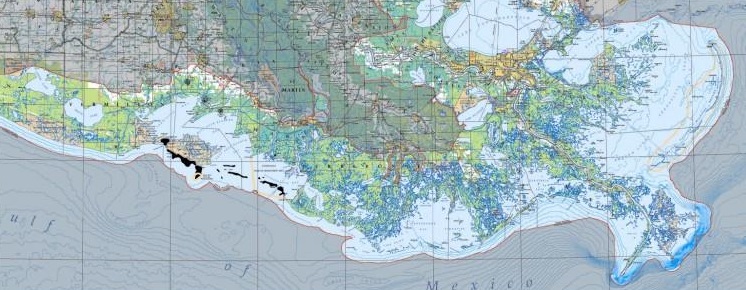
October 17-18, 2019
Dalton J. Woods Auditorium
Energy, Coast & Environment Building
93 S. Quad Drive
Louisiana State University
Baton Rouge, LA 70802
The Third Annual La. Geological Survey Coastal Symposium, the premier annual academic Louisiana coastal conference, will bring together scientists, engineers, geographers, and policy makers from across the range of geoscience-related disciplines to exchange ideas, interpretations, and insights into Louisiana coastal geology - both onshore and offshore - and on associated topics.
This year's focus will be on coastal geoscience, specifically including coastal geology, geophysics, geomorphology, and geography.
John Johnston III of the Louisiana Geological Survey will serve as the symposium chair, and Chris McLindon of the New Orleans Geological Society will serve as the vice-chair and keynote speaker.
For registration information, visit the Coastal Symposium webpage.
Posted July 30, 2019
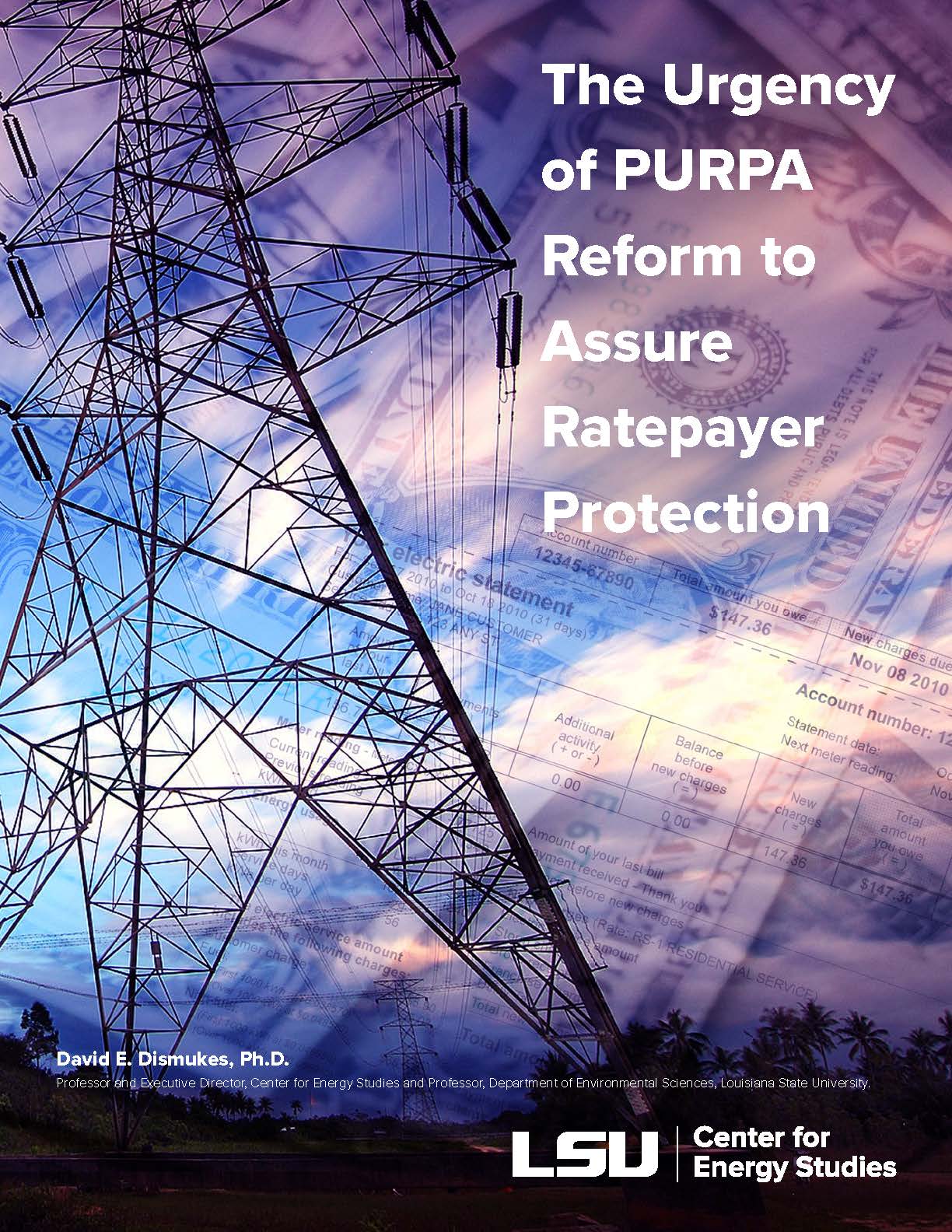 Dismukes: Reforming Outdated Public Utility Regulatory Policies Act (PURPA) Will Protect
Utility Ratepayers
Dismukes: Reforming Outdated Public Utility Regulatory Policies Act (PURPA) Will Protect
Utility Ratepayers
David E. Dismukes, Professor and Executive Director of the LSU Center for Energy Studies,
recently published new research recommending the immediate reform of the Public Utility
Regulatory Policies Act, or PURPA, a piece of federal legislation adopted during the
energy crises of the 1970s and early 1980s.
Dismukes’ research finds that PURPA’s overly-generous and unnecessary “buy-back” provisions
have led to the development of around 70,000 megawatts (MW) of excessive renewable
generation capacity equivalent to more than $100 billion in new capital investment
that is being paid for by retail utility ratepayers.
Dismukes notes that, in 1978, the year in which PURPA was passed, electric utilities
were vertically integrated and highly regulated monopolies, and non-utility energy
represented less than five percent of total U.S. power generation. At the time, PURPA
tried to subject wholesale power generation to competition by introducing a host of
new players and new capacity. PURPA forced regulated utilities, who at the time owned
all power transmission assets, and were the direct link to end-user customers, to
purchase electricity from these new generation developers at a set of fixed prices
and contract terms. Back then, PURPA represented “a disruptive piece of federal legislation”
that ultimately helped to prove that electric power generation was not a natural monopoly
and that competition could be sustained in the electric power industry.
However, since that time, electricity markets have undergone more than three decades
worth of reform, making them highly competitive with numerous wholesale buyers and
sellers. PURPA’s mandatory purchase requirements are not needed today, especially
given the highly competitive nature of regional electricity markets and the regulatory
provisions that require power transmission systems to be operated and governed to
support open and non-discriminatory access. The mandatory buy-back provisions included
in PURPA simply force utilities to purchase electricity generation capacity that is
not needed at prices that do not reflect current market fundamentals. Ultimately,
the financial liability of these federally mandated excess electricity purchases will
be passed on to ratepayers.
Dismukes says that continuing to allow renewable developers to take advantage of these
PURPA buyback provisions will continue to lead to long-term ratepayer financial burdens,
incentivize uneconomic renewable energy capacity development, and ultimately increase
ratepayer costs. Dismukes notes that PURPA reform “should eliminate a set of regressive
and excessive subsidies that benefit large renewable generation developers and their
investors—and burden retail ratepayers.”
The Institute for Energy Research contributed to Professor Dismukes' research. View or download the paper here.
Posted July 24, 2019
Announcing Energy Summit™ 2019, Oct. 23
Wednesday, Oct. 23, 2019
12 Noon - 5:15 p.m., with reception following
Several prominent speakers from the oil, gas and power industries will present at this year’s Energy Summit on Oct. 23. The conference, presented by the LSU Center for Energy Studies, or CES, serves as a forum for energy professionals from throughout the Gulf Coast to discuss timely energy issues and energy market trends. This year’s theme is “Challenging Traditional Paradigms.”
The afternoon event begins with an introduction by CES Executive Director and Professor David Dismukes. Travis Kavulla, NRG Energy Inc. vice president for regulatory affairs, will present on new policy directions for the electric power industry. Robert Kleinberg, senior research scholar with the Columbia University Center on Global Energy Policy, will discuss methane emissions from upstream oil and gas facilities. Kirk Barrell, president of Amelia Resources, will provide an overview of the Louisiana Austin Chalk formation and the Louisiana-Mississippi Stack Play. Kenneth D. Simonson, chief economist for the Associated General Contractors of America, will give an outlook for construction spending, labor and materials costs. And Sam Scupham, director for northeast U.S. solar photovoltaics with engineering firm Black & Veatch, will provide an update on battery storage.
“We’re excited about the speakers we have visiting CES and the topics they will be
covering,” Dismukes said. “The industry is in such a state of change, and we have
such a wide range of speakers touching on a number of these aspects of industry change
that there should be something interesting for everyone at this year’s event.”
Energy Summit will begin at noon with a light lunch and run through 5:15 p.m., followed
by a reception. The event takes place in the Dalton J. Woods Auditorium in the Energy,
Coast & Environment Building, located at 93 South Quad Drive on the LSU campus.
The event is open to the public. Registration is required. Energy Summit attendees regularly include representatives from the upstream oil and gas industry, pipeline companies, storage and mid-stream companies, petrochemical companies, gas and power utilities, state environmental and utility regulators, state agency heads and staff members, legislators and legislative staff, university students, faculty and staff, and the media.
WHAT: Energy Summit 2019: Challenging Traditional Paradigms
WHEN: Wednesday, Oct. 23
WHERE: Energy, Coast & Environment Building’s Dalton J. Woods Auditorium – 93 South
Quad Drive; Baton Rouge
Energy Summit 2019 information here.
Posted June 19, 2019
CES Names Scholarship Recipients for 2019-20 Academic Year
The Center for Energy Studies recently awarded scholarships for the 2019-20 academic year to four LSU students pursuing energy-related fields of study and careers. The Center congratulates our scholarship recipients and wishes them well as they continue their studies.
LMOGA/Brooksher Scholarship
 Shelby Wainwright, sophomore majoring in finance, from Hammond, La.
Shelby Wainwright, sophomore majoring in finance, from Hammond, La.
"I am so excited to receive this award. The scholarship will allow me to have so many
opportunities this semester."
F. Malcolm Hood Scholarship
 Kelly Robertson, junior majoring in chemical engineering, from Alexandria, La.
Kelly Robertson, junior majoring in chemical engineering, from Alexandria, La.
"I am so thankful for this scholarship as it will aid in helping me continue in my
academic endeavors as I move toward my goal of obtaining a degree in chemical engineering
and working in the energy sector one day."
David Olver Memorial Scholarship
 Felix Rodrigue, junior majoring in electrical engineering, from Slidell, La.
Felix Rodrigue, junior majoring in electrical engineering, from Slidell, La.
"It is an honor to be named a recipient of the GCPA David Olver Memorial Scholarship.
I would like to thank the Gulf Coast Power Association emPOWERing Foundation for their
generosity. This award is very beneficial in the continuation of my degree and a career
in the energy field."
GCPA emPOWERing Women Scholarship
 Claire Kelley Pearson, sophomore majoring in electrical engineering, from Mandeville,
La.
Claire Kelley Pearson, sophomore majoring in electrical engineering, from Mandeville,
La.
"I want to personally thank [the Center] and the Gulf Coast Power Association for
making GCPA emPOWERing scholarship available. I feel so honored to have been selected,
and I deeply appreciate your generosity....With this financial support, I will be
able to reduce my work schedule so that I can focus more on my studies and work on
research.... The [award] has inspired me to give back to others. One day, I hope to
help students with support similar to what I have received from you."
Posted June 19, 2019
Dismukes, Co-authors Complete NETL CarbonSAFE Report
In 2017, LSU researchers received a $1.4 million grant from the National Energy Technology Laboratory, or NETL, a part of the U.S. Department of Energy, to study the feasibility of industrial carbon capture and storage, or CCS, along the Louisiana Chemical Corridor. The award is part of NETL's Carbon Storage Assurance Enterprise, or CarbonSAFE, program, which seeks to develop an integrated CCS storage complex constructed and permitted for operation in the 2025 timeframe in several phases.
Led by CES Executive Director and Professor David Dismukes, the research team includes Brian Snyder, assistant professor, Department of Environmental Sciences, LSU College of the Coast & Environment; Richard Hughes, professional-in-residence, LSU Department of Petroleum Engineering; Mehdi Zeidouni, assistant professor, LSU Department of Petroleum Engineering; Muhammad Zulqarnain, postdoctoral researcher, Louisiana State University, Keith Hall, director, Mineral Law Institute, LSU Law; Chacko John, (retired) associate director & professor, Louisiana Geological Survey; Brian Harder, research analyst, Louisiana Geological Survey; Michael Layne, graduate assistant, Louisiana State University; and Juan Lorenzo, associate professor, LSU Department of Geology & Geophysics.
The study conducted an initial emissions screening analysis by identifying the top ten industrial carbon emission sources, six of which are in close proximity to one another in the South Louisiana industrial corridor. Among its findings is the fact that the capture component of an industrial CCS project is the largest individual cost item and can account for as much as half of an industrial CCS investment; however, higher CO2 concentrations and pressures allow for capture systems with lower operational and capital costs.
The source facility and storage location chosen for the feasibility study were, respectively, CF Industries and Bayou Sorrel. Ultimately, the integrated economic feasibility analysis shows that a CCS project in South Louisiana will likely not be economically viable. These economic feasibility results, however, are dependent upon the candidate source and sink and other factors driving project economics. That said, Louisiana has a favorable set of laws and regulations for CCS development, as well as a long history with underground storage rights. Further, the Louisiana Legislature has passed statutes over the past several years that provide clear guidelines on how CO2 will be injected into storage facilities and monitored. These statutes should reduce a considerable amount of business liability and legal risk for CCS developers.
Posted March 27, 2019
Board of Regents Nominates Upton for Revenue Estimating Conference Position
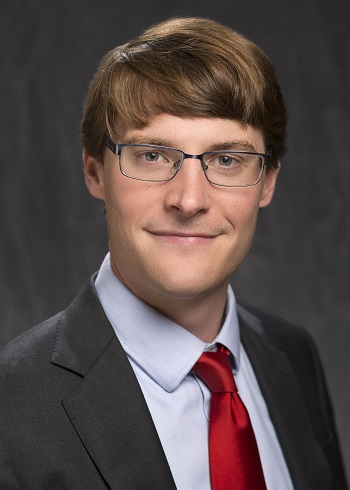 LSU Center for Energy Studies, or CES, Assistant Professor Gregory B. Upton, Jr.,
is one of three candidates nominated by the Louisiana Board of Regents, or BOR, for
the Louisiana Revenue Estimating Conference, or REC. Members of the REC will choose
one person from the three BOR nominees to replace LSU Professor Jim Richardson, the
current economist, who will step down in June of this year after 30 years of REC service.
LSU Center for Energy Studies, or CES, Assistant Professor Gregory B. Upton, Jr.,
is one of three candidates nominated by the Louisiana Board of Regents, or BOR, for
the Louisiana Revenue Estimating Conference, or REC. Members of the REC will choose
one person from the three BOR nominees to replace LSU Professor Jim Richardson, the
current economist, who will step down in June of this year after 30 years of REC service.
“This is a great honor to be considered for such an important role. I look forward to the opportunity to serve my state in this capacity if chosen among the three highly qualified candidates.” said Upton.
Upton joined the CES faculty in 2014 and since that time has researched a wide-range of Louisiana-specific energy issues, including the impact of the oil price collapse on Louisiana’s budgetary challenges, solar tax credits and net metering policies in the state, and the implications of lifting the federal crude oil export ban. In 2018, he authored the chapter “Mineral Revenues in Louisiana,” published in Exploring Long-Term Solutions for Louisiana’s Tax System, a byproduct of more than a year’s worth of Upton’s extensive research on how upstream oil and gas impacts Louisiana public revenues and the Louisiana economy.
Upton has presented his research to more than 80 industry, governmental, and academic audiences, and has been cited more than 50 times in local and national media. He has co-authored a number of studies examining the economic impact of various energy infrastructure development projects on the Louisiana economy. He holds a Ph.D. in economics from Louisiana State University, where he also received both an M.A. in economics and a B.S. in economics with a concentration in empirical analysis.
CES Executive Director, Professor David Dismukes noted, “We are proud of Greg and his nomination. His expertise in energy economics, and how energy impacts the entire Louisiana economy, not just in upstream oil and gas, but throughout the entire energy value chain to petrochemicals and refining, will be an asset to the Louisiana Legislature.”
About the REC
The REC has constitutional authority and responsibility to provide official revenue
estimates for the state. Its four principal members are the governor or designee,
President of the Senate, Speaker of the House, and a faculty member with revenue forecasting
expertise from a Louisiana university or college.
The REC prepares estimates of money to be received by the state general fund and dedicated
funds for the current and upcoming fiscal years that are available for appropriation,
and it designates whether money in the estimates will be recurring or nonrecurring.
All REC decisions on whether to adopt the estimates must be unanimous.
Posted February 26, 2019
Upcoming Events in April: 13th Annual La. Water Conference, Oil & Gas Symposium
Louisiana Geological Survey and Center for Energy Studies faculty will present two events during the week of Spring Break: April 15-17, 2019: The 13th Annual La. Water Conference and the Oil & Gas Symposium. Join us for one or both events, which address important natural resource, water, and energy issues for Louisiana and the Gulf Coast. Continuing education for professional geoscientists (PG), professional engineers, and attorneys may be available.
13th Annual Louisiana Water Conference
15-16 April 2019
 Dalton J. Woods Auditorium
Dalton J. Woods Auditorium
Energy, Coast, & Environmental Building
93 S. Quad (formerly Nicholson Extension)
Louisiana State University
Baton Rouge, Louisiana
Presented by
Louisiana Geological Survey, Louisiana State University Agricultural Center, &
Louisiana Water Resources Research Institute
The Louisiana Water Conference aims to disseminate the latest water-related research
and activities within and around Louisiana, promote education and public awareness
of Louisiana’s valuable freshwater resources, and promote engagement of water-use
sectors.
Click here for more information and to register.
Oil & Gas Symposium
17 April 2019
 Dalton J. Woods Auditorium
Dalton J. Woods Auditorium
LSU Energy, Coast & Environment Building
93 S. Quad (formerly Nicholson Extension)
Baton Rouge, LA 70803
Presented by
Louisiana Geological Survey and LSU Center for Energy Studies
This symposium will bring together scientists, engineers, and policy makers from across
a range of disciplines to discuss the current state of the oil and gas industry in
Louisiana, and its interaction with our ecosystem. John E. Johnston III of the Louisiana
Geological Survey and Greg Upton of the LSU Center for Energy studies will serve as
the symposium chairs.
Click here for more information and to register.
Posted February 1, 2019

The Future of Solar in Louisiana
An Analysis of the Technical and Economic Implications of Solar P.V. Growth on Louisiana’s Economy and Electric Grid
Dr. Gregory B. Upton, Jr., Center for Energy Studies, Louisiana State University
Dr. Farzad Ferdowsi, Department of Electrical & Computer Engineering, University of
Louisiana, Lafayette
Dr. Amin Kargarian, Division of Electrical & Computer Engineering, Louisiana State
University
Dr. Shahab Mehraeen, Division of Electrical & Computer Engineering, Louisiana State
University
 In June of 2016, the Louisiana Board of Regents provided support as part of its Industrial
Ties Research Subprogram (ITRS) to study how solar could be incorporated into the
electric grid and whether the incorporation of battery storage could enhance the scalability
of this resource in an economical way. Industry partner Southwestern Electric Power
Company (SWEPCO) also provided data and support including technical engineering data
on its distribution grid. This collaborative effort between the LSU Center for Energy
Studies, the Louisiana Board of Regents, and SWEPCO has resulted in a report that
assesses both the technical and economic implications of the solar industry in Louisiana.
In June of 2016, the Louisiana Board of Regents provided support as part of its Industrial
Ties Research Subprogram (ITRS) to study how solar could be incorporated into the
electric grid and whether the incorporation of battery storage could enhance the scalability
of this resource in an economical way. Industry partner Southwestern Electric Power
Company (SWEPCO) also provided data and support including technical engineering data
on its distribution grid. This collaborative effort between the LSU Center for Energy
Studies, the Louisiana Board of Regents, and SWEPCO has resulted in a report that
assesses both the technical and economic implications of the solar industry in Louisiana.
The two-part report addresses the incorporation of solar PV from both an engineering and economic perspective including:
- The degree to which solar growth can cause challenges to the distribution grid that electric utilities are responsible for maintaining in order to provide safe, reliable and affordable electricity to Louisiana’s residents.
- The economics of behind-the-meter solar in light of both reduced solar tax credits and rate design changes.
View or download the solar report here.
Posted February 1, 2019
Mineral Revenues in Louisiana
Status Report Submitted to Senate Committee on Revenue and Fiscal Affairs and House
Committee on Ways and Means of the Louisiana Legislature 
Dr. James A. Richardson, LSU Public Administration Institute
Dr. Greg Upton, LSU Center for Energy Studies
In the 2018 second extraordinary session, Senate Concurrent Resolution (SCR) 4 was
passed asking Dr. Jim Richardson and Dr. Greg Upton to make specific recommendations
to the legislature regarding mineral taxes in Louisiana. The motivation for this request
was based on work conducted by the Task Force on Structural Change in Budget & Tax Policy and a recently published book chapter on the topic. View or download the SCR 4.
The economists were asked to explore possible changes to the Louisiana mineral tax
structure and consider the following goals:
- Preserve or improve the competitiveness of the oil and gas extraction sector in Louisiana.
- Decrease or remove the difference in tax rates for oil and gas.
- Create an equitable system of severance tax exemptions on all wells, not just horizontal wells.
- Hold constant or increase mineral revenues for the state.
- Explore other reasons why oil and gas production is fluctuating in the state of Louisiana and any changes that need to be made to increase production.
This document serves as the preliminary status report highlighting the work conducted in the first year of a three-year study process.
View or download the Status Report.
Posted January 19, 2019
The Center for Energy Studies is now accepting applications for the 2019-2020 academic year
The Center for Energy Studies is now accepting applications for its four scholarships for the 2019-2020 academic year.
Application deadline: 26 April 2019.
LMOGA/Robert R. Brooksher Memorial Scholarship
This scholarship was established to honor one of the original supporters of CES. The
purpose of the scholarship is to support the educational goals of LSU students interested
in energy-related fields, with a particular emphasis on energy policy related to the
oil and gas industry. The annual scholarship is awarded in the amount of $1,000.
F. Malcolm Hood Memorial Scholarship
Established to honor one of the original supporters of CES, this scholarship supports
the educational goals of LSU students interested in energy-related fields, with a
particular emphasis on energy policy. Two scholarships are awarded in the amount of
$1,000 each.
David Olver Memorial Scholarship
A scholarship opportunity for LSU students interested in future careers in the electric
power industry, the David Olver Memorial Scholarship, financially supported by the
Gulf Coast Power Association emPOWERing Foundation, offers an annual award in the
amount of $2,500.
GCPA emPOWERing Women Scholarship
Provided by the Gulf Coast Power Association emPOWERing Foundation, the emPOWERing
Women Scholarship is intended for female LSU students interested in future careers
in the electric power industry. The annual award amount is $2,500.
NOTE: Final award amounts may vary and are subject to availability of funds.
See our Scholarship page for qualification requirements and to apply.
